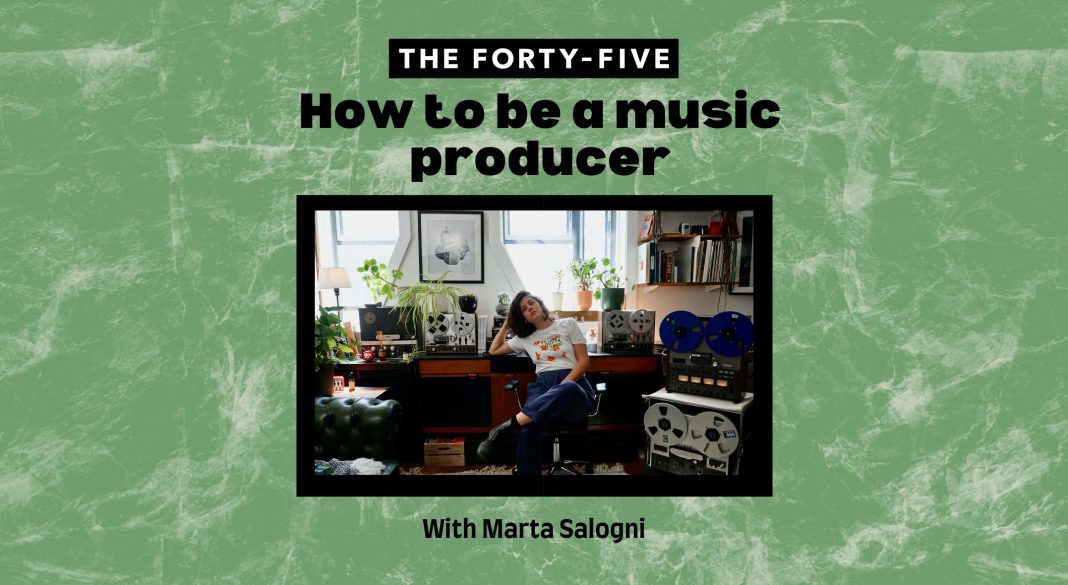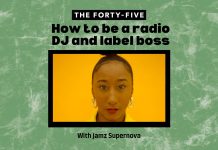Over more than a decade in the industry, Marta Salogni has become one of the most respected music producers in the game having worked with a huge and varied selection of artists including Björk, Depeche Mode, MIA, Romy, Dream Wife and many many more. With the number of female producers (only 5% of the industry worldwide) still staggeringly low, Marta’s tenacity and refusal to see these stats as an obstacle has seen her thrive; now, she’s dedicated to bringing up other women and non-binary talents and opening the door for more to follow in her footsteps. “Representation is so important, and I really believe that more diversity will enrich the music landscape as a whole,” she tells us.
Want to get behind the desk and become the next production legend on the block? Here are Marta’s tips for making those all-important first steps.
Ask Questions
I started to get interested in producing when I was 15. I was part of a group who would meet up in this social centre that had a venue at the back and, one afternoon, I took a walk and saw the box with the mixing desk; I asked to be introduced to the sound engineer and he started describing to me how the mixing desk worked. I started seeing it as another instrument but where you’re not seen on stage. I found it very freeing, the idea that you could alter the listener’s experience on an emotional level and the sound on a quality level; that it could tie in art and science together. It felt like a world where there would always be scope with experimentation. I fell in love with it at first sight.
If you can’t afford to study, don’t let that stop you
My learning at school was very short, nine months, because I couldn’t afford any more so I made the most of it. There are parts of the job that are good to learn at school – the more technical, theoretical side – but most things I learnt on the job by being left alone with a recording or in a session where I had to really throw myself in. If you don’t have the opportunity to study then try and befriend people in the same situation and split the cost of things; buy some gear and learn it together. If it’s possible to create a community around you, that always helps and you can bring each other up.
Break things down into manageable chunks
If you look at a really big mixing desk, it’s just one channel multiplied by however many channels, so always break it down into one and learn what one does. Then you know that everything else does the same. A big mixing desk is quite intimidating at times, and each studio has different qualities, but ultimately it’s a matter of keeping calm and understanding that it’s all about getting from A to B. There’s a signal, a source and a destination, so thinking about it in those simpler terms can make it easier to break down something that might feel intimidating at the start.
Don’t expect miracles straight away
When I first moved to London I found a job in post-production, which wasn’t the one I truly wanted but it really helped to learn about sound. Finding a job in a studio is hard because most won’t have many openings for assistants, but I was really determined so I started bringing my CV to different studios and calling them up. Amongst probably 40, one said, ‘I’m not gonna give you a job but we can meet’ and that was enough. Sometimes to put a foot in the door, you need someone to hold it open just slightly for you. If someone gives you an opportunity, it’s up to you to make the most of it.
Be brave
When you’re in front of a choice and you’re leaving something that’s kind of stable for something that’s your dream, just go for it. The first session I worked on, I’d had to drop my stable job and I was just mainly making teas and coffees, but then I was called back for a different session, and then I went back and met a producer who needed an assistant which became my first opportunity of properly doing what I really wanted to do.
Helpfulness works both ways
When you’re in the learning process, it’s not about taking and taking – it’s also keeping the right balance where you’re giving a lot and then people will give to you. When you have no credits under your belt, the hardest thing is getting some. So whenever the studio was free, I’d ask the studio manager if I could use the room in exchange for making the studio tidier than I found it. I made sure to keep good relationships with everyone. As you’re trying to progress, it’s good to be able to always give back as soon as you can.
Forge relationships
I went to concerts and, if I liked the band, I’d ask if they wanted to record with me. I didn’t have a lot of credits but I could offer my services and a studio, and they’d get a demo or a finished mix. If you work with a band that’s starting out when you’re starting out, then hopefully they remember you and things come back years down the line. You’ve got to stick to your guns and work with people and music that you like, then the chances are high that you’ll get called back. It’s a small industry and word of mouth is important.
Writing a CV? Do this
Sometimes it’s not about having a thousand credits, sometimes it’s the opposite. To be an assistant, first thing I’d look for is someone who can be methodical and tidy with very deep attention to detail – someone who can understand that the hours don’t need to be long if you really do your job properly which, for an assistant, would mainly be someone who’s proficient with ProTools or is willing to learn. I look for the hunger for learning and the spark that makes you believe they want to be there and that it means something to them – and someone who can make my life easier and be proactive! When you’re an assistant, you should always try and anticipate what someone wants before they’re asked; don’t wait to be asked to set up a vocal mic, just set it up. Be bold but also know when it’s time to sit and wait.
Screw the comfort zone
Every album pushes me out of my comfort zone and I don’t want to be in my comfort zone! I know what that looks like so I want something different!





